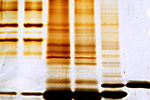- GU Home
- Faculties
- Institutes and Facilities
- Institute MBW
Institute for Molecular Bio Science

There are currently eleven working groups at the Institute; they investigate a wide variety of molecular aspects of life. This research primarily focuses on microorganisms and plants. Membrane Biology is traditionally one of the strongest areas at the Institute. In this context, the focal point is the analysis of the structure and function of membrane-bound proteins, as well as their regulation and participation in intracellular signalling cascades. In the field of Biotechnology, work is being conducted on the development of microbial cell factories using both classical and recombinant methods to bring about overproduction of a range of enzymes and chemicals. Another new aspect of this field is the identification, characterisation and application of new metabolites from the secondary metabolism of entomopathogenic microbes. Metabolic pathways are selectively altered, e.g. to produce biofuels or to develop therapeutic methods of improving cellular defence.
In Microbial Physiology the emphasis is on metabolic physiology, specifically on its regulation and genetic basis in the Archaea, Bacteria and Eukaryota. The results of this study form the basis of analysis by membrane biologists and biotechnologists, leading to close networking both within the faculty and beyond. Research topics in Molecular Plant Physiology are the energy metabolism of photosynthetic organisms and its underlying organelle interactions. Physiological, structural, biochemical and genetic investigation all play an important part in this research.
Degenerative Processes and Molecular Stress focuses on the investigation of molecular aging mechanisms, especially the role of mitochondria in the aging process, as well as the analysis of cellular responses to heat and light stress. The groups working on Protective Functions of Carotenoids are investigating the molecular mechanism of carotenoid function in strong light conditions, as well as in protection from reactive oxygen species and membrane damage caused by external factors. In the field of Regulatory RNAs, the research focuses on structural and functional analysis of regulatory non-coding RNAs and their interactions with proteins, as well as their biological functions and cellular regulation.
|
Department |
Title |
First Name |
Surname |
|||
|
Prof. |
Jörg |
|||||
|
Prof. |
Eric |
|||||
|
Merck-Stiftungsprofessur Molecular Biotechnology |
Prof. |
Helge |
||||
|
Prof. |
Volker |
|||||
|
Prof. |
Beate |
|||||
|
Molecular Cell Biology of
Plants |
Prof. |
Enrico |
||||
|
mRNA-based gene regulation |
Prof. |
Andreas |
||||
|
Plant Cell Physiology |
Prof. |
Claudia |
||||
|
Prof. |
Yvonne |
|||||
|
Physiology and Genetics of
Lower Eukaryotes |
Prof. |
Eckhard |
||||
|
RNA Regulation in Higher
Eukaryotes |
Prof. |
Michaela |
||||
|
RNA Structural Biology |
Prof. |
Jens |
|
Title |
First Name |
Surname |
Department |
|||
|
Prof. |
Beate |
|||||
|
Prof. |
Claudia |
|||||
|
Prof. |
Helge |
|||||
|
Prof. |
Eckhard |
|||||
|
Prof. |
Eric |
|||||
|
Prof. |
Volker |
|||||
|
Prof. |
Michaela |
|||||
|
Prof. |
Enrico |
|||||
|
Prof. |
Andreas |
|||||
|
Prof. |
Jörg |
|||||
|
Prof. |
Yvonne |
|||||
|
Prof. |
Jens |
Managing Director:
Prof. Dr. Michaela Müller-McNicoll
Assis. Managing Director:
Prof. Dr. Claudia Büchel
Further information: eMail
Dr. Markus Fauth
Tel: 069 798 29603
Dr. Matthias Rose
Tel: 069 798 29529
Institute for Moelcular Bio Science
Campus Riedberg
Biocentre
Building N210-207
Post office box 6
Max-von-Laue-Str. 9
D-60438 Frankfurt
T +49 69 798-29603
F +49 69 798-29600
E info-mbw@bio.uni-frankfurt.de
- Studying at Goethe University
- International applicants
- Faculties
- Overview of study programmes
- Programme for refugees
- GRADE
- Goethe Business School (continuing education)
- Research at Goethe University
- Scientific news
- Goethe Welcome Center (for international researchers)
- Collaborative research projects
- Individual research
- Visiting fellowships
- Endowed chairs
- About the University
- News-in-brief
- University administration
- Campus locations
- Campus life
- University archives (German)
- Rhine-Main-Universities





